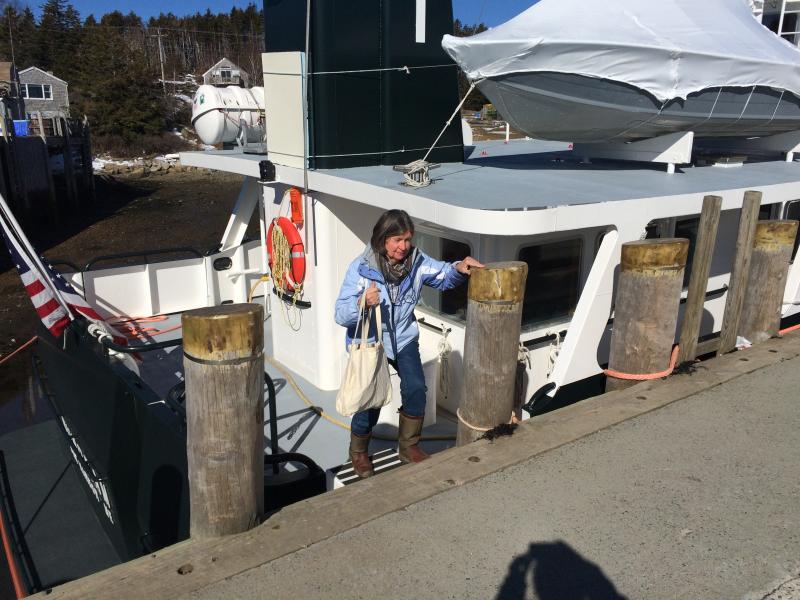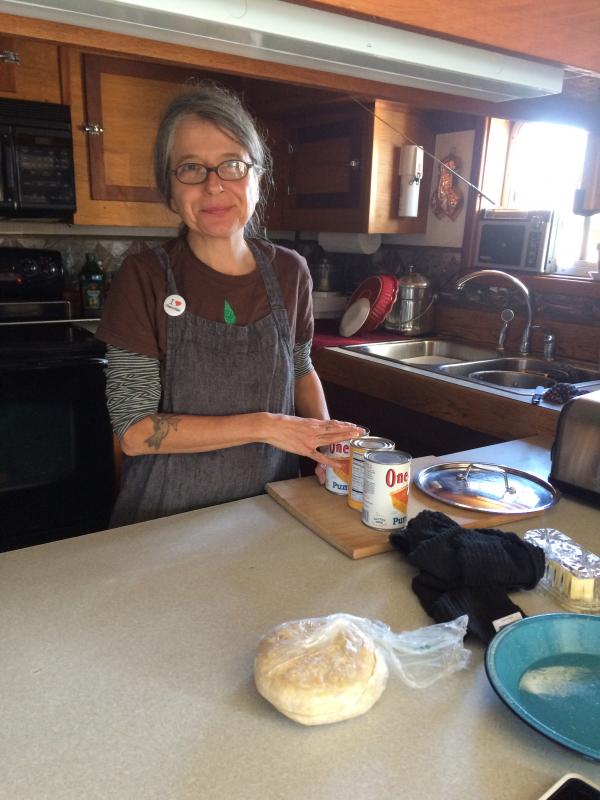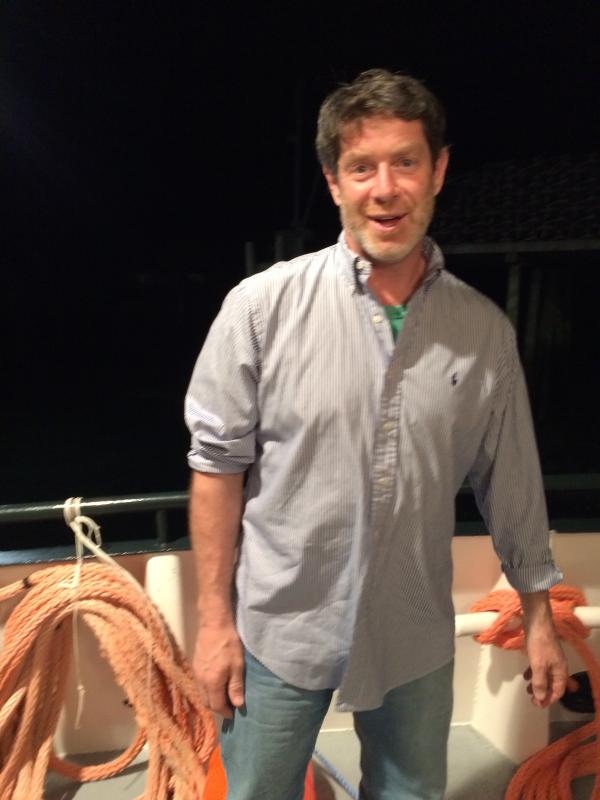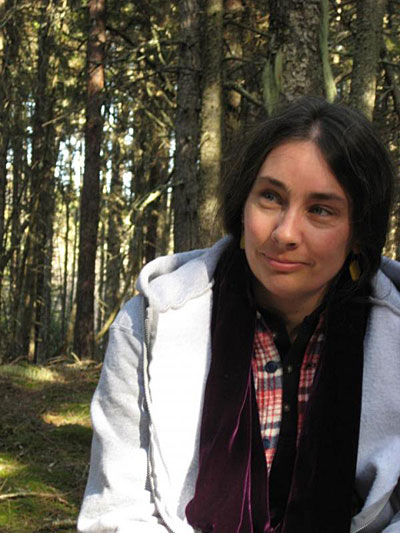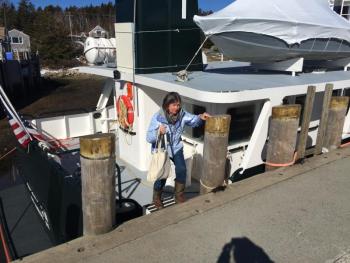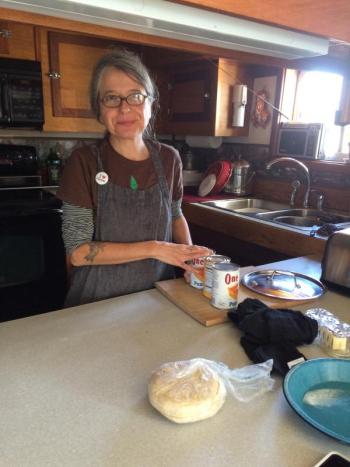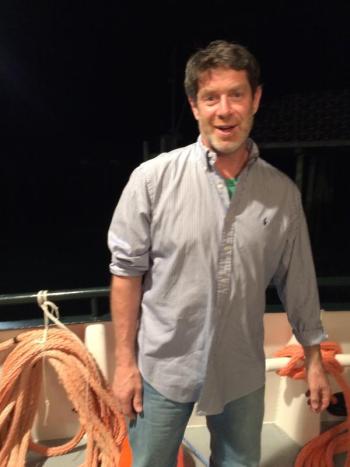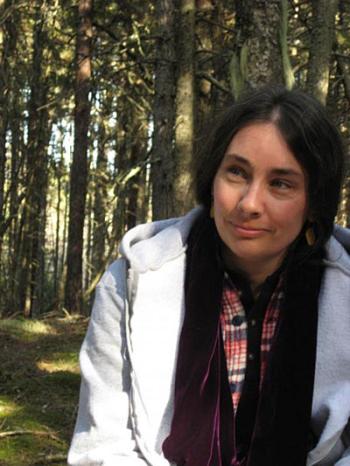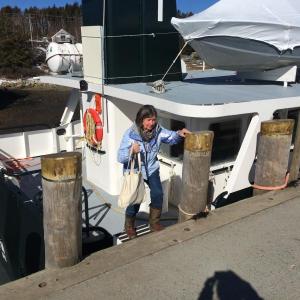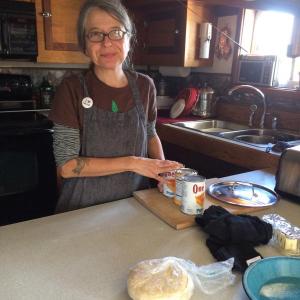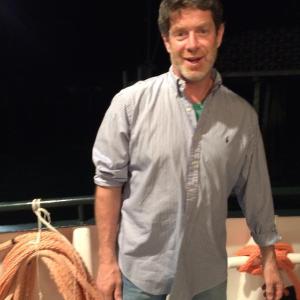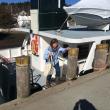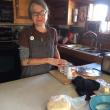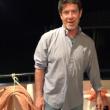Without an Agenda: talking with the crew of the ‘Sunbeam’
Sharon Daley, RN is the first and to date the only nurse associated with the telemedicine program on the Maine Seacoast Mission vessel Sunbeam, which makes regular visits to many of Maine’s offshore islands offering telemedicine services, home health nursing visits, and other types of support. Sharon lives on Islesboro with her husband, but she grew up on a farm in Missouri.
“Being a farmer is not that different from being a lobsterman in some ways. You’re self-employed, it’s hard work, and it’s weather-dependent.”
“I’ve been a nurse since the 1970s, and have worked in all kinds of nursing. It’s a real honor to be part of this work on the Sunbeam.”
“When I first started this job, somebody was going to introduce me around one of the others islands. She drove me to the top of the hill and said, ‘Get out and introduce yourself at all these houses, and when you’re done, I’ll drive you back to the harbor.’ I knocked on everybody’s door and said I was from the Sunbeam and everybody let me in. I’m sure that wouldn’t never have happened if I hadn’t been able to mention the Sunbeam. Later my driver said to me, ‘The reason I didn’t go with you is I don’t get along with a few of those people, and if I had come with you it would have made it harder for you.’ It was good that I had done home health before and I was used to knocking on doors and introducing myself.”
Sharon, in person, and the telemedicine services available on the boat allow islanders access to many types of medical care without an expensive and sometimes difficult trip to the mainland. She performs lots of blood pressure checks and answers questions, offers flu shots and similar immunizations and tests, and organizes confidential patient conversations with physicians through the video link. She carries a sophisticated laptop computer with peripherals that allow a doctor elsewhere to see that infected cut, that sore throat, or that ear infection clearly, thanks to high-speed internet. She brings presenters to the islands to talk about, for example, occupational safety concerns for fishermen. She makes a round of house calls and does routine check-ups for the elderly and chronically ill. She is sometimes the school nurse for a one-room school. She is sometimes just a knowledgeable friend to talk with about some minor health concern when you aren’t sure you need a doctor.
Sharon explained that she works with “a great bunch of providers who are very dedicated to the people they serve, the people on the islands. They jump through hoops to make this work.” For example, this winter, many of the Sunbeam’s island trips got canceled due to bad weather. For at least one island, provider appointments for island patient had to be rescheduled three times. “They’re really, really dedicated. These medical providers also give me the orders enabling me to do what I do, because for a nurse, even a flu shot or taking out stitches somewhere requires doctors’ orders. The care management part is huge.”
It is difficult enough, in a very small town, to have a private conversation with a nurse or doctor, or a counselor of any kind, or a chaplain or member of the clergy. Sharon the nurse and Douglas the chaplain work hard to establish trust and to maintain confidentiality. The crew of the Sunbeam has been interviewed, filmed, and written about a great deal—the rest of the country finds this work and these offshore islands interesting—and they have developed some standard responses to the questions about “What do you do?” The work of the Maine Seacoast Mission is to “meet people where they live,” to “build healthier communities, by land and sea.” They ask islanders to make known what they need, but the “needs of the islanders” in a specific sense must often remain vague in public discussion. In small towns—and islands are certainly very small towns—maintaining confidentiality, upholding professional ethics, and establishing trust takes care.
I stomp around insisting, “Many of us don’t need anything! We come aboard this boat for the pie! We only need the steward, we need the cook!” Just because we live on islands doesn’t mean we have long lists of unmet needs. Realistically, however, most everybody needs something at some point—even if it’s just somebody different to talk to once in a while--and there may be some who need a good deal more than pie.
I asked Sharon this:
“Has anybody, anywhere in Maine, ever asked you in the context of your work with the Sunbeam or the Seacoast Mission, for help with alcohol-related issues?
“Yes.”
For help with marital problems?
“Yes.”
End-of-life care issues?
“Yes.”
Abusive relationship issues?
“Yes.”
Financial problems?
“Yes.”
Depression?
“Yes.”
Feelings of isolation, even if not clinical depression?
“Yes.”
And, the big one--opioid addiction?
“Yes.”
I asked Sharon to talk about what she, Sunbeam chaplain Douglas Cornman (busy elsewhere at the time of my interview,) and the Mission in general are doing to respond to the opioid crisis in Maine. “What is it that you guys actually do, hands on, to assist on the islands?”
“What we do, first and foremost, is listen and be available and not judge. So, when somebody comes to me with any issue related to drug problems, I’m listening and caring. Specifically what we can do is link the person up with counseling over the telemedicine unit. They can come aboard and have counseling (in the privacy of the clinic room). If they need suboxone, we find them a provider they can connect with. Nurses can’t be suboxone providers, and the crew doesn’t do the actual counseling. We do carry Narcan (naloxone, an emergency response drug for life-threatening opiate overdose) on the boat, but have not needed it.”
“We’ve set up everything from court-mandated counseling to when somebody just comes aboard and talks to me and I link them up with a professional. We work with a number of different counselors. Acadia Family Center does a lot, and also MDI Behavioral Health.
“I think the stigma (of talking about opioid use) has definitely decreased over the past few years, just like it has with mental health issues. It needs to decrease even more. A question I get asked is ‘Is there more drug abuse on the islands than on the mainland?’ and I usually respond, ‘I don’t know that to be the case, but if somebody is doing drugs on an island, it’s more obvious to their neighbors. If somebody is using drugs in town, it could be that nobody knows.”
“I think one difficulty on the islands is how sometimes what makes a person stop drugs or alcohol is when basically the bottom falls out of their world. They could lose their license, their job, their livelihood, they might lose their partner. So they might say, “I’ve got to make some changes, I’m in trouble.” But, on some of the islands you drive anyway, licensed or not. If you make your living as a self-employed lobsterman you’re not going to lose your job. The hardest part is you can’t change your peer group. And, of course, there’s the lack of services. It’s not that people don’t get sober on islands, but it’s often a lot harder.”
Professionals, volunteers, and people who have gone through these struggles agree that a supportive peer group of some kind is an enormous—almost essential—part of staying sober, and that it is extremely difficult to change addiction-related behaviors when your only friends, co-workers, or family members continue the behavior you are trying to stop. In an isolated community of 40 or 50 people, somebody trying to stop drinking, for example, might not have a lot of social options.
Sharon added, “One thing that I think has been good is I’ve brought doctors and counselors from MDI Behavioral Health and Acadia along on the Sunbeam, so the people from the islands could meet them and get to know them as people. But also, importantly, these providers got to see the islands, so they have a better understanding of what the islanders are up against” (in terms things like of small-town social realities, limitations to transportation, and minimal services).
I asked Sharon whether she thought people were ever hesitant to participate in support services because lack of confidentiality--the old problem of, “Hey, Bill, I saw your truck parked outside the community hall…”
“I have a list of all the AA meetings, and AA people who have agreed to be available, so somebody who comes aboard and says they have a real problem with alcohol, I can put them in touch with somebody to talk with right away. I can’t always do that with a counselor, but for AA there are people they can talk to, volunteers on the telephone. I have set up island-to-island AA meetings, where there was a fisherman in a place where there was no AA meeting but there was a Polycom (videoconferencing unit, available in many island schools).
“Everybody says ‘There’s no AA on an island, there’s only A.’ It’s not anonymous. So, yes, that’s a problem. Also, if there are only two or three people in that AA meeting, they say, “We’re sick of hearing each other’s stories! We want to hear somebody else’s story!”
“One year we actually went through an island phone book and, name by name, asked ourselves ‘Has this person used any of our services,’ and I think we came up with something like 90%. Of course, the sternmen aren’t generally in the phone book. I have captains who come to me and talk about their sternmen, or people say, ‘Come see this guy, he’s not looking good.’ Somebody might ask me to check their blood pressure, and then while we’re in that private clinic room, they might mention something about the domestic violence case down the road, or an alcohol or drug problem.”
“Something I learned about in nursing school that I thought I knew, but I didn’t really deeply understand until I took this job, is how some people have a lot of health issues--all the time it’s something--and once we get to the bottom of it, their problem really depression. Once they start seeing a counselor, a lot of the physical symptoms go away.”
I brought up how March on an island has classically been considered the hardest time, and asked, “Do you see a seasonal impact on people in terms of depression?”
Sharon’s reply was particularly interesting to me, and it defied the stereotype of the “long lonely winter.”
“I see August as also being hard for people on all the islands.” (Hearing these words from her made me smile, as I personally feel the stress of the intensely busy summer much more acutely than any stress from a low population, even though that issue gets little media attention in Maine). “The population on every island doubles (or more,) and everybody’s working really hard, and having so many people around always needing a lot of things can be really hard. By August, people are ready for it to be quieter.”
“On the islands that have ferries, residents can’t get on and off when they need to. If you get off your island you can’t necessarily get home because of the long line for the ferry. Summer is not a vacation time when you live around here. I think people are very stressed in the summer.”
I could have hugged her. We hear a lot about the impacts on mood and mental health of isolation and long winters, but less about the sense of being overwhelmed, overworked, or “always on call” during a Maine coast summer.
Sharon also spoke about how she got to know islanders by making herself available in a variety of informal settings. “I do house calls (such as for elderly and others who request a regular visit,) but I also do what I call “truck calls,” which is why I try to always walk places instead of borrowing a car. People offer me vehicles on the islands but I walk when I can, because you run into people. That’s when a fisherman might pull over in his pickup, roll down the window and say “Hi,” and then say, “I’ve been having this problem with my foot.” Some people are more comfortable doing that. That’s also why we get up at 4:00 in the morning in the summertime (when alongside an island wharf) and make sure the light is on, so people on their way to haul can come aboard and get a cup of coffee and talk about whatever is on their mind.”
Speaking of coffee: Sunbeam steward Jillian, who uses just the one name, lives in Cherryfield. Aboard the ‘Beam her domain is the galley, from where she feeds crew and visitors alike. Sometimes islanders are invited aboard for supper, but all through the day working islanders stop in for coffee break and to raid the famous cookie jar. Sometimes people ride along on a trip among the islands to give presentations or to learn how this all works—medical professionals and counselors, journalists and documentarians (who all seem to think they’re the first ones to report on the Sunbeam,) and all sorts of others. The day we spoke (earlier in March,) a former Matinicus one-room schoolteacher was along, just to say “Hi” to old friends and stay connected with the island she’d grown to love.
You don’t have to have an identified need to come aboard and be helped to feel good, and that’s largely the responsibility of the cook. The sense of community helped along by a good meal is not lost on Jillian, who has long been involved in community support activities through food outside of her role as Sunbeam cook:
“Seven years ago we started our regular community supper in Cherryfield, and for seven years every Sunday we’ve served a free meal. The Mission said we could use their building, but we don’t allow an agenda. Different host groups volunteer, but there is no salesmanship, no preaching--just eating and breaking bread. I just learned the value of just sitting with your neighbor and eating at a big table. People love to come together. Providing a meal for people is an honor and I love the simplicity of it. It’s so vital to spend time with a neighbor without an agenda.”
I said to Jillian, “Your role and the role of every steward before you has been larger than your bosses may know. You’re not just here to support the crew, but you’re here to support us all in an abstract sense. You provide the service that is the hardest to measure.”
She replied, with a grin “Not really—you cut a pie into eight pieces!”
We spoke about the stereotype of the Sunbeam as “the church boat,” or these days, “the medical boat.” Sharon said, “Some people call it “the cookie boat.” Former boat minister Ted Hoskins called it “the floating truck stop.” Guys would stop in during their workday, grab something sweet, go up to the wheelhouse and hang around gabbing with the captain and the engineer for a little while. It’s just a social call, but we all knew the Sunbeam crew was here for us if we ever needed anything.
As I spoke with crew members I managed to make my way through a big slice of Jillian’s blueberry pie which, I must say, I liked better than my own blueberry pie. A visit aboard the ‘Beam generally does involve temptation toward sugary treats. I joked with Sharon about her role as nurse, presumably tasked with reminding everybody to eat their vegetables, while Jillian is offering all sorts of wonderful desserts. “Actually,” Sharon insisted, “I don’t do that!”
The Sunbeam’s galley smelled like melted marshmallow as Jillian was making Rice Krispies bars. She grinned and quietly observed that, “Nobody wants kale bars.”
Event Date
Address
United States

